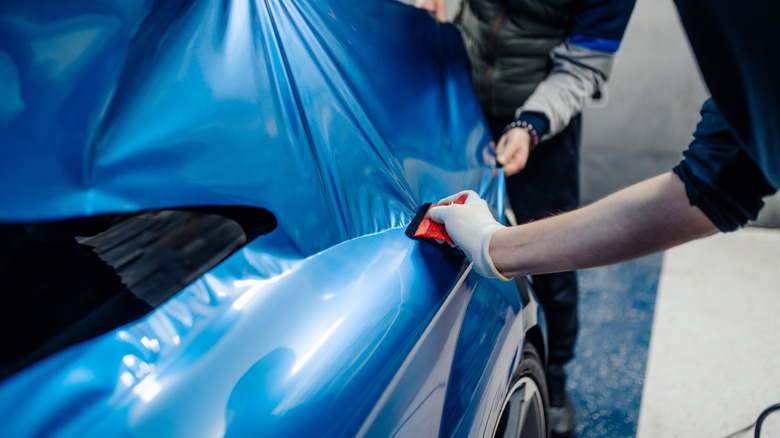How Car Wraps Actually Work
Re-painting your car can be a great way to personalize your vehicle and give it a little more pizazz. Unfortunately, it's permanent, meaning you can't change your mind and go for a different look after it's all said and done without repainting the whole car. It's also expensive and often requires several hours of work from a dedicated automotive shop to get a quality coat of paint. Therefore, wrapping your car is a popular alternative to a full paint job and offers a few advantages (as well as some disadvantages) comparatively.
Car wraps can transform the look of your vehicle in a way that would be incredibly difficult (or flat-out impossible) if you decided to paint it. It's often the go-to option for tuners looking to make their car stand out. According to Car and Driver, a wrap on a car, when properly applied, can actually preserve the original paint underneath the vinyl. As opposed to a traditional paint job, where even a single part may require a lot of time buffing, sanding, and multiple coats of paint to get the look right, wrapping a car is a relatively straightforward process.
A simple way to change your car's look
According to Edmunds, a wrap usually consists of a printed vinyl sheet that adheres to every surface of a car. This vinyl decal can be a solid color, take on the appearance of reflective metal, or be any pattern you can dream up. Because the wrap is typically generated from a giant specialized printer, the design choices are essentially only limited to what you or a designer are able to conjure. Businesses often use vinyl wraps to advertise on company vehicles as hand painting a sign or logo on the side of a car would be incredibly costly and time consuming.
If you're considering a wrap for your car, there are a few important things to note. First, the paint on your car needs to be in fairly good shape to ensure the wrap adheres correctly. As Edmunds notes, a poor original paintjob, or flaky paint can not only show up through the wrap, but it can also cause the paint to flake off when the wrap is removed. Next, the car's bumpers, doors, and other surfaces need to be free of dents and dings to make sure the new vinyl sticks in place and doesn't accentuate any existing damage.
According to Edmunds, simple wraps for most cars will cost between $3,000 to $4,000. That price can double or triple if the wrap features a complex design or if you decide to wrap a supercar. Properly maintained and kept out of harsh weather, a professionally applied vinyl wrap can be expected to last around five years (per Edmunds).
